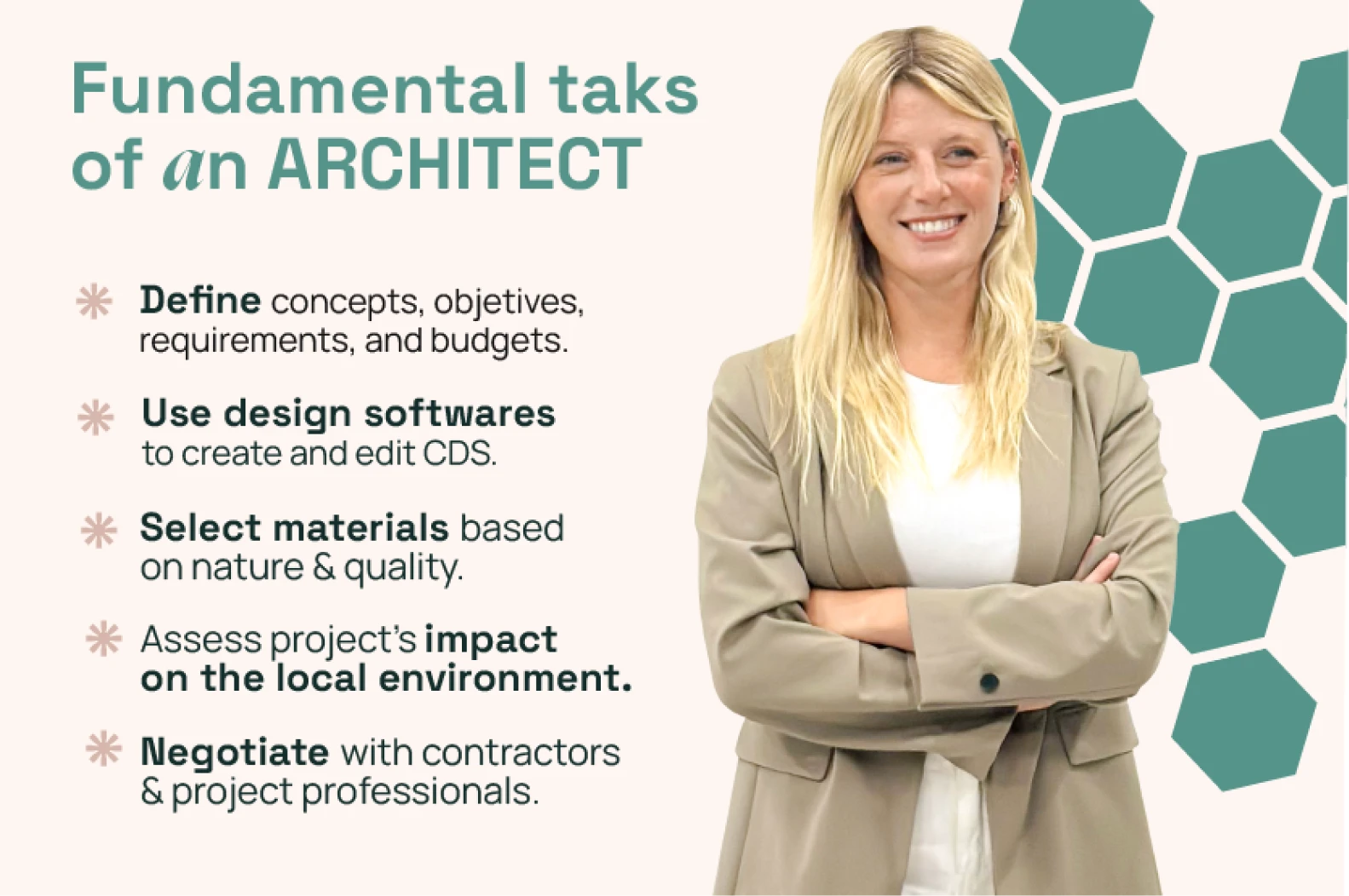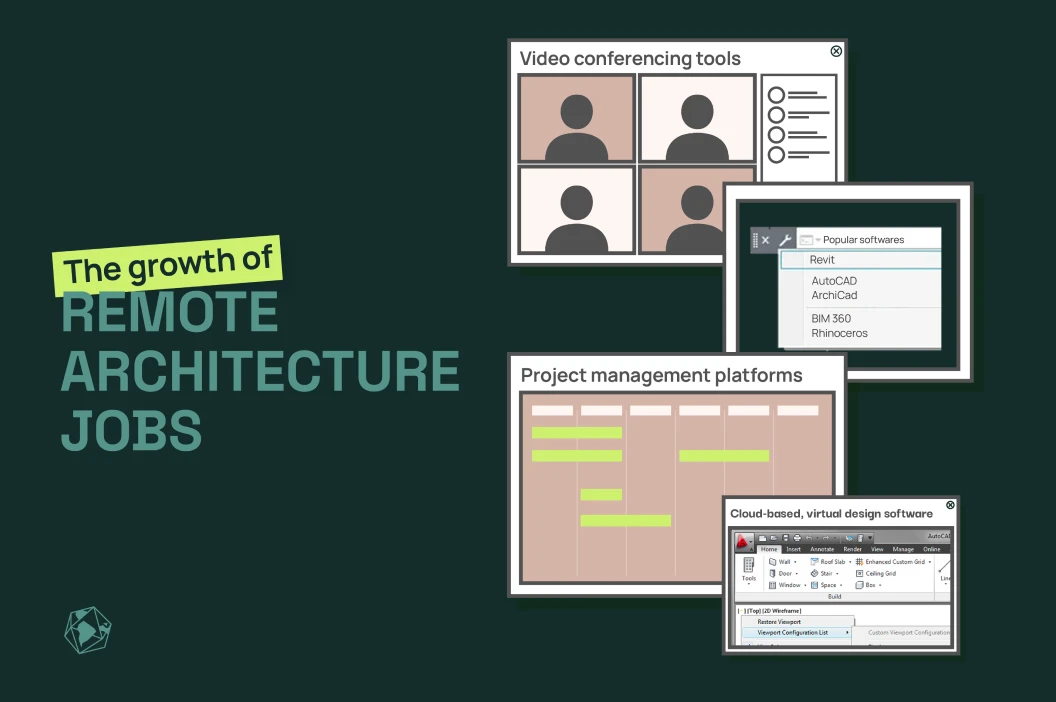Embracing Remote Architecture Jobs: A Growing Trend to Unlock Flexibility, Balance, and Global Opportunities
Unseen perks of remote architecture opportunities bring new perspectives on the formula to thrive professionally while creating a fulfilling lifestyle.
5 min read

The architecture industry is constantly evolving. In recent years, we have seen a growing trend towards remote work in many fields, and architecture is no exception.
Remote architecture jobs are becoming increasingly popular as more and more architects now realize the benefits of working from home and creating the work-life balance they want as part of a generation with new well-being needs.
A remote architecture opportunity means that you can do your job as an architect anywhere in the world. All you need is a computer and an internet connection to work from home, a coffee shop or even the beachside. Flexibility and responsibility are not antagonistic words any more.
Remote freelance architecture jobs have witnessed a surge in popularity and transformed the way architects perceive their careers. The increasing trend of remote work, in general, has contributed to this shift, driven by the digital era we live in and the pursuit of improved work-life balance.
In this article, we will delve into the reasons behind the growth of remote architecture jobs, highlight their benefits for architects, address the challenges they may encounter, provide strategies for overcoming them and offer valuable tips and resources for architects seeking remote opportunities. By embracing remote work, architects can find flexibility, balance and a huge step toward a rewarding career.
First Things First: Why are Architectural Services in High Demand?
As a graduate architect, your trained eye and your valuable creative, visual, and design skills are sought after by many companies. Architects are always in demand, and there are various avenues to advance your career. Continuously exploring opportunities and understanding market needs is essential. Employability extends beyond your CV; it involves effectively showcasing your value to companies in need of your services.
Architects combine technical expertise with artistic vision to create functional and aesthetically pleasing structures. Architecture offers a broad range of professional possibilities. While you may have chosen this career path with some understanding, there is always more knowledge to gain through practical experience.
Although often overlooked, examining the diverse activities and tasks architects undertake provides insight into the potential of remote work. Architects engage in designing buildings from scratch, as well as working on extensions and modifications to existing structures. The restoration and preservation of architectural heritage is a deeply engaging and captivating field. Projects can span from individual buildings to large-scale redevelopment schemes, encompassing landscape and interior design.
Architects maintain open communication with clients and users to deliver accurate designs that fulfill functionality, safety, and cost-effectiveness requirements. While many architects manage projects from start to finish, studios and firms break down work into teams to optimize results. If we were to distill their work into fundamental tasks, architects:
Architects are in charge of creating spaces that change people’s lives, and this is not something that just anyone can do.

The Increasing Trend of Remote Work
Remote work has become a global phenomenon, reshaping traditional (or archaic?) job structures across all industries. Architects, like professionals in other fields, have embraced the trend, leading to the rise of virtual architecture opportunities.
This shift can be attributed to several factors, including the advancement of technology, changing work preferences, and the impact of the COVID-19 pandemic.
After accepting this change of era, architects are now empowered to break free from the confines of a physical office, collaborate from anywhere, and design friendlier schedules and routines.
While remote work has undoubtedly presented its challenges, architects have adapted and thrived in this new landscape. They have embraced the inherent flexibility, innovative technologies, and collaborative potential that virtual architecture offers. As the world continues to evolve, architects are at the forefront of redefining the future of work, leveraging the transformative power of remote collaboration to create inspiring and sustainable architectural marvels.
Factors Contributing to the Growth of Remote Architecture Jobs
Technological advancements have played a crucial role, as architects now have access to cloud-based, virtual design software, video conferencing tools and project management platforms.
These tools enable seamless collaboration regardless of geographical location, eliminating the need for physical presence.
In addition, COVID-19 has accelerated the adoption of remote work as architecture firms started to seek alternative ways to continue their operations amidst lockdowns and social distancing measures.
Another factor that has contributed to the growth of remote architecture jobs is the changing needs of clients. In today’s global economy, clients are often located all over the world.
This means that they may not want to hire an architect who is only available during local business hours. By hiring remote architects, clients can get the expertise they need without worrying about time zone differences.

Benefits for Architects: Flexibility, Work-Life Balance, and Global Opportunities

Challenges Architects May Face in Remote Work
While remote drafting architecture jobs offer numerous benefits, they also present unique challenges. One significant hurdle is the potential for communication gaps and a lack of face-to-face interaction.
Architecture heavily relies on effective collaboration, and to work from home drafting demands architects to be proactive in bridging communication gaps through clear and consistent channels.
Overcoming these challenges requires discipline, establishing a dedicated workspace, and adhering to a structured schedule. Remote architects need to be able to manage their time like pros and stay focused on their work. They also need to be able to communicate effectively with clients and colleagues in the digital space.
Establishing regular communication channels and utilizing video conferencing tools can enhance collaboration and maintain effective teamwork. Setting clear expectations and defining project milestones with clients and colleagues fosters transparency and accountability. Adopting project management software can streamline workflows and track progress.
Another crucial element is to set up a dedicated workspace at home. This will help you to create a clear separation between your work life and your personal life. It is also very important to build a strong network of support. This could include other remote architects, mentors and people you love.
Having a strong network of support can help you to stay motivated and overcome any challenges a new opportunity may bring.
Tips for Architects Seeking Remote Opportunities

There are a few things you can do to increase your chances of success if you are interested in pursuing remote opportunities:
Remote architecture jobs can be a rewarding career choice for architects who are looking for flexibility, work-life balance, and global opportunities. If you are up for the challenge, enter our CareerSite and find the remote opportunity that is right for you.
Take your career to a whole new level!





